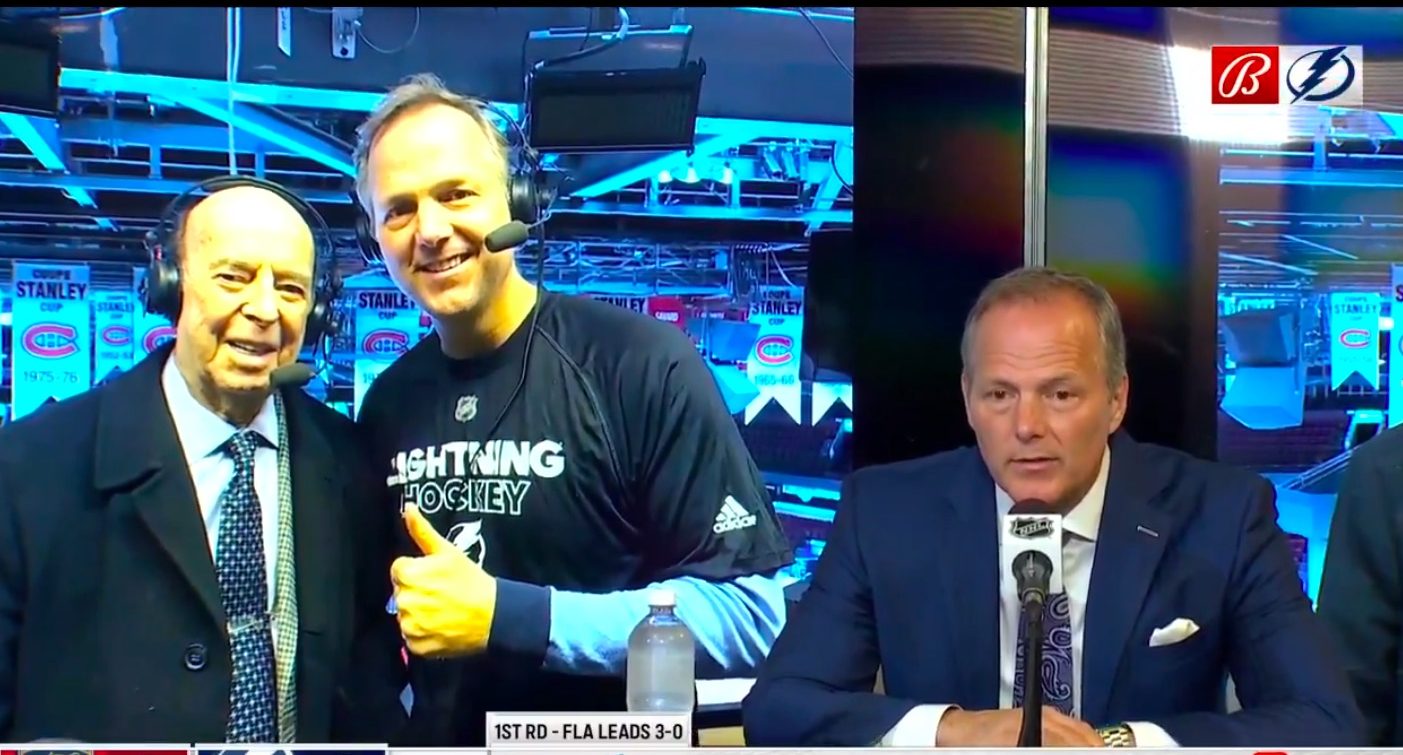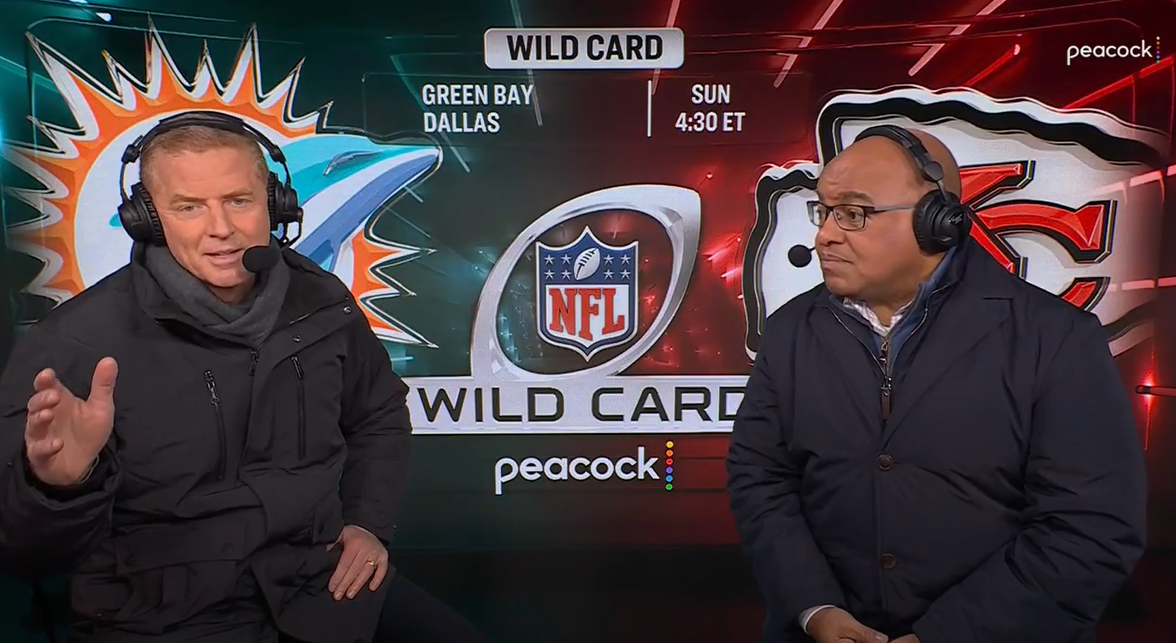Since November, there’s been an interesting court battle going on with the Washington Football Team, with minority owners Dwight Schar, Fred Smith and Robert Rothman filing a federal lawsuit to try and sell their combined shares (which total 40 percent of the team) as a group to prospective buyers Behdad Eghbali, José Feliciano and Kwanza Jones for $900 million. That above report (from Will Hobson, Mark Maske and Liz Clarke in The Washington Post on Nov. 20) says that “according to people familiar with the situation,” majority owner Dan Snyder (seen above ahead of a 2018 game) is blocking the sale by trying to exercise his right of first refusal for the shares held by Smith and Rothman, but not the 15 percent held by Schar. And this lawsuit has now wound up thoroughly in the media realm, with Snyder claiming in a filing Wednesday that “I firmly believe that Plaintiffs’ motion and supplemental filing and the news articles that they have generated are the latest in the effort to extort me.”
What articles in question are those? Well, the motion referenced came Friday, with that seeing the minority shareholders asking U.S. District Judge Peter J. Messitte to sanction Snyder for “violating a Nov. 19 court order barring all parties from leaking information about negotiations, disparaging one another or otherwise interfering with the process.” The perhaps even more notable recent article was Tuesday’s piece in the Post detailing a $1.6 million confidential settlement paid to a former female employee of the team in 2009 after she accused Snyder of sexual misconduct. And Snyder is now blaming Schar for the recent rounds of headlines, as Mike Florio writes at ProFootballTalk:
In the document, Snyder initially focuses on the potential connection between Schar and Monday’s report that Snyder settled a sexual misconduct lawsuit in 2009 for $1.6 million. Although Snyder doesn’t expressly claim that Schar leaked the information to the Washington Post, Snyder suggests that a recent court filing by Schar and the other minority owners contained “irrelevant and spurious material” that, when quoted by the story from the Post regarding the settlement, “improperly give the misleading impression . . . that there was merit to the allegations of misconduct,” and that the purpose of the court filing by Schar and the other minority owners “is now clear: to try to continue to smear me in an effort to gain leverage in this business dispute.”
Snyder then alleges in the declaration that Schar has “knowledge that no evidence of wrongdoing was found after an investigation by a well-respected law firm,” and that Schar “nevertheless threatened to reveal [the settlement] to discredit me and embarrass my family, but which the insurance carrier decided to settle.” Although not expressly linked to the report of the $1.6 million settlement, the context plainly indicates that this statement represents Snyder’s response to the question of whether he engaged in misconduct in connection with the events leading to that settlement.
Snyder’s declaration then pivots to the broader allegation that Schar has tried for months, via articles ultimately appearing in the Washington Post “that characterized the Team and me personally in a negative manner,” to pressure Snyder to sell. Snyder claims that Schar has “funneled information about me and the team to Mary Ellen Blair, a former Executive Assistant with the Team, to be proivided to The Washington Post.” Snyder also contends in the declaration that Blair has confirmed that Schar “told [her] to share information with The Washington Post,” and that Schar’s daughter bought Blair a “‘burned phone’ in order to attempt to escape detection of Mr. Schar’s conspiratorial communications.”
Snyder’s declaration subsequently alleges that, “[f]or the past five months, there have been repeated threats by Mr. Schar and others associated with him.” Snyder’s declaration alleges that, on July 25, Schar threatened Snyder’s personal attorney, “telling him that the threat he has been seeking to hold over me would come out if I didn’t ‘just sell the team’; that I ‘won’t have a choice’; that the story ‘will kill Dan’; and that I ‘will suffer a terrible existence.’”
There are a few things to keep in mind with these back-and-forth filings. One is that media coverage absolutely can have an impact on the outcome of a sale like this, and the minority owners could benefit from negative coverage of Snyder. If pressure builds to a point where Snyder sells his stake in the teame, the minority 40 percent Schar, Smith and Rothman collectively hold suddenly might be more valuable; a buyer of Snyder’s share might pick up the minority shares as well. And that could be a difference of hundreds of millions of dollars.
As the Post‘s Nov. 20 piece noted, the team was estimated at a value of $3.5 billion by Forbes this year. That would make 40 percent worth $1.4 billion. But those valuations usually apply to controlling stakes rather than minority shares, which explains why the accepted offer (which Snyder is blocking with his attempts to exercise a right of first refusal for Smith and Rothman’s shares but not Schar’s, which led to this initial lawsuit) for the group’s 40 percent share was only $900 million. So, yes, there would seem to be incentive for Schar to “smear [Snyder] in an effort to gain leverage in this business dispute.” But that doesn’t necessarily prove that he’s doing it.
It’s worth remembering that just because media coverage has an impact on an outcome, that doesn’t mean the coverage was constructed to create that outcome. The Post‘s discussion of that 2009 $1.6 million settlement is an example of that; yes, that’s coverage that is negative for Snyder’s image, and it’s possibly helpful for Schar. But that settlement itself is absolutely newsworthy, especially with the Post‘s comprehensive coverage this summer of stories of 15 former Washington employees who said they experienced sexual harassment at work, plus stories from female journalists who covered the team (which led to a call for change from the Professional Football Writers of America), plus stories from another 25 employees later on.
That’s led to the NFL conducting an investigation into those reports, with former attorney general Loretta Lynch recently added to that probe. So coverage of that settlement (and of some of the other intertwined actions here) has value to the public beyond what it means for Snyder or Schar. And it’s not proven at all at this point where the coverage of that settlement came from, and what role if any Schar played. And even if Schar or the other minority owners are proven to have been involved in some way, that might have negative impacts on their court case given that November order, but it doesn’t mean that this settlement wasn’t worth covering.
The claims here about Schar buying Blair a burner phone for communications with him also need to be considered carefully for what they are. They are not claims that the Post information is solely sourced from Blair or that the Post improperly handled information from her, but rather only claims that Schar and Blair were in secret contact. That doesn’t necessarily mean anything negative when it comes to the actual Post coverage; if information was obtained from Blair, and if it was run through a proper filter of bias consideration, it could still be valuable even if Schlar did tell Blair to talk to them. That could be bad for Schlar given the no-leak order, but it’s not necessarily an indictment of the paper’s coverage.
It’s also worth noting that Snyder isn’t the only one claiming the other side is using the media against him. As mentioned, the minority owners’ filing Friday claimed Snyder’s side was leaking to The New York Times about a possible sale of their shares to Snyder. And that story, by Ken Belson and Katherine Rosman, had claims of its own about the 2009 settlement, including that “The team fired the woman because it said she lied to the team’s lawyers.”
The minority owners objected to that story in a court filing Monday, and said it showed that Snyder’s side was leaking to the media. Their filing says “This self-serving and one-sided framing of a serious accusation of sexual misconduct against Mr. Snyder, which depicts the victim as someone who ‘lied’ and portrays the settlement solely as a payment ‘to avoid negative publicity if the woman sued,’ further confirms that Mr. Snyder or his agents are the source of the leaks of confidential information.” For what it’s worth, Snyder disputed that in another filing Tuesday, saying he didn’t leak the information himself and he doesn’t believe his advisors did.
At any rate, this isn’t the end of the battle over the media discussion here. There will be a virtual hearing before Judge Messite on Jan. 7, with Snyder, Schar, Rothman and Smith all slated to appear to discuss their back-and-forth claims about the other side leaking information. We’ll see what that leads to. But it’s clear that both sides in this ownership dispute have strong thoughts about what media coverage of it might mean, and that both of them are claiming the other side is leaking information to the media in defiance of a court order on the matter.
[The Washington Post; photo from Brad Mills/USA Today Sports]





